Mimi Abramovitz
Stanley Aronowitz
Kafui Attoh
Stephen Brier
Juan Battle
Michael Javen Fortner
Joshua Freeman
Penny Lewis
Stephanie Luce
Ruth Milkman
John Mollenkopf
Ed Ott
Frances Fox Piven
Basil Smikle
James Steele
Mimi Abramovitz
Consortial Faculty
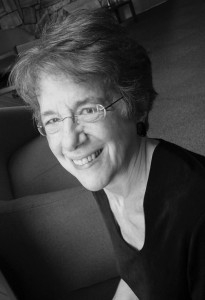
Professor of Social Policy at the Silberman School of Social Work at Hunter College, and a Roosevelt House Faculty Associate; Faculty of the CUNY Graduate Center and the Murphy Institute for Worker Education and Labor Studies
Areas of expertise: women, poverty, human rights, and the U.S/Welfare State
Mimi has published widely on issues related to women, poverty, human rights and the U.S/ Welfare State. Her books include the award-winning Under Attack, Fighting Back: Women and Welfare in the U.S., Regulating the Lives of Women: Social Welfare Policy From Colonial Times to the Present, The Dynamics of Social Welfare Policy and Taxes Are A Woman’s Issue: Reframing the Debate. She has also published more than 80 articles in scholarly and popular journals. Among her honors and awards, Dr. Abramovitz has been inducted into the Columbia University School of Social Work Hall of Fame.
Stanley Aronowitz
Consortial Faculty
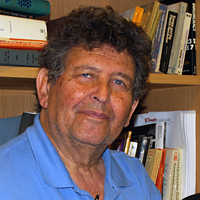 Distinguished Professor of Sociology, CUNY
Distinguished Professor of Sociology, CUNY
Areas of expertise: labor, social movements, science and technology, education, social theory, and cultural studies
Stanley has taught at the Graduate Center since 1983. He received his B.A. at the New School in 1968 and his Ph.D. from the Union Graduate School in 1975. He studies labor, social movements, science and technology, education, social theory, and cultural studies and is director of the Center for the Study of Culture, Technology and Work at the Graduate Center.
Aronowitz is author or editor of twenty-six books, including Taking It Big: C. Wright Mills and the Making of Political Intellectuals (2012), Against Schooling: For an Education That Matters (2008), Left Turn: Forging a New Political Future (2006), Just Around the Corner (2005), How Class Works (2003), The Last Good Job in America (2001), The Knowledge Factory (2000), The Jobless Future (1994, 2010), with William DiFazio, and False Promises: The Shaping of American Working Class Consciousness (1973, 1992).
Aronowitz is founding editor of the journal Social Text and is currently a member of its advisory board. Most recently, he cofounded Situations: Project of the Radical Imagination and serves as coeditor in the journal’s editorial collective. He also serves on the advisory board of WorkingUSA: The Journal of Labor and Society, and has sat on the editorial boards of Cultural Critique and Ethnography. He has published more than two hundred articles and reviews in publications such as Harvard Educational Review, Social Policy, The Nation, and The American Journal of Sociology. Before coming to the Graduate Center he taught at the University of California–Irvine and Staten Island Community College (now the College of Staten Island). He has been visiting professor or scholar at University of Wisconsin–Madison, the University of Paris VIII, Lund University (Sweden), and Columbia University.
Kafui Attoh

Assistant Professor of Urban Studies at the Joseph S. Murphy Institute for Worker Education
Areas of expertise: political economy of cities; the politics of public space 1) urban transit’s role within the political economy of cities, 2) the struggles and livelihoods of the transportation disadvantaged and 3) the role of urban social movements (including the labor movement) in shaping mass transit policy.
Kafui received his BA from Macalester College and his PhD in Geography from Syracuse University. His broad interests are in the political economy of cities, the politics of public space and debates in and around the idea of the “right to the city.” More narrowly, Kafui’s research has focused on three areas: 1) urban transit’s role within the political economy of cities, 2) the struggles and livelihoods of the transportation disadvantaged and 3) the role of urban social movements (including the labor movement) in shaping mass transit policy. His work has appeared in Progress in Human Geography, New Labor Forum, The Journal of Cultural Geography, The Geographical Bulletin, ACME: An International E-Journal for Critical Geographies, Urban Studies, Antipode and Space and Polity.
Juan Battle
Consortial Faculty
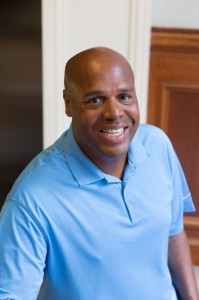 Professor of Sociology, Public Health, and Urban Education at the CUNY Graduate School, Murphy Institute for Worker Education and Labor Studies
Professor of Sociology, Public Health, and Urban Education at the CUNY Graduate School, Murphy Institute for Worker Education and Labor Studies
Areas of expertise: race, sexuality, and social justice
Juan is coordinator of the GC’s Africana Studies Certificate Program. His research focuses on race, sexuality, and social justice. He is the coeditor of Black Sexualities: Probing Powers, Passions, Practices, and Policies (2010); he has also authored dozens of book chapters, academic articles, and encyclopedia entries. Battle has delivered lectures at a multitude of universities, colleges, community-based organizations, and funding agencies throughout the world, and his scholarship has included work throughout North America, South America, Africa, Asia, and Europe.
His work has been highlighted in popular national magazines, radio shows, and newspapers, among them Black Entertainment Television (BET), Essence, and the Advocate. He currently heads the Social Justice Sexuality initiative—a project exploring the lived experiences of Black, Latina/o, and Asian lesbian, gay, bisexual, and transgender people in the United States and Puerto Rico.
Battle was recently a Fulbright Senior Specialist and the Fulbright Distinguished Chair of Gender Studies at the University of Klagenfurt, Austria; he is currently an affiliate faculty member of the Institute for Gender and Development Studies (IGDS), the University of the West Indies, St. Augustine, Trinidad and Tobago. He is a former president of the Association of Black Sociologists and is actively involved with the American Sociological Association (ASA).
In 2002, Arise magazine named him one of the top “Ten Black Men Transforming the World.” Battle’s research has been funded by the National Institutes of Health (NIH), the National Science Foundation (NSF), the Ford Foundation, and the Arcus Foundation. He is on the editorial boards of several academic journals, including Contemporary Sociology, Journal of African American Studies, Sociological Quarterly, Western Journal of Black Studies, Journal of Negro Education, and the Journal of Poverty. He received his A.S. and B.S. from York College of Pennsylvania and his M.A. and Ph.D. from the University of Michigan.
Stephen Brier
Consortial Faculty
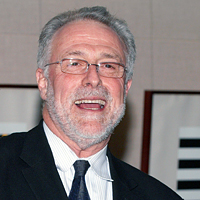 Historian, Professor, Ph.D. Program in Urban Education and Coordinator, Interactive Technology and Pedagogy Certificate Program, CUNY Graduate Center, Murphy Institute for Worker Education and Labor Studies
Historian, Professor, Ph.D. Program in Urban Education and Coordinator, Interactive Technology and Pedagogy Certificate Program, CUNY Graduate Center, Murphy Institute for Worker Education and Labor Studies
Areas of expertise: history of public education; issues related to race, class, and ethnicity in U.S. history as well as on the uses of digital technologies and tools to improve academic teaching, learning, and research.
Stephen Brier teaches courses on the history of public education. His current work focuses on the struggles over community control of the New York City public schools in the 1960s and their impact on teacher unionism and educational reform as well as on the contemporary crisis in public higher education, with a special focus on the history of the City University of New York. Brier is completing a book (with Mike Fabricant) entitled Austerity Blues: Fighting for the Soul of Public Higher Education, which will be published by Johns Hopkins Univ. Press in 2016. He founded the Interactive Technology and Pedagogy Certificate Program at the Graduate Center in 2002, continues to serve as its coordinator, teaches one of the program’s core courses, and supervises all of its independent studies. He also co-founded and co-directs the Graduate Center’s M.A. in Liberal Studies Digital Humanities track and is a member of the faculty of the American Studies Certificate Program.
Brier is a social and labor historian who has published widely on issues related to race, class, and ethnicity in U.S. history as well as on the uses of digital technologies and tools to improve academic teaching, learning, and research. He was the founding director of the Graduate Center’s American Social History Project/Center for Media and Learning (which he headed for eighteen years) and was the executive producer of the project’s award-winning “Who Built America?” multimedia curriculum, including textbooks, videos, and CD-ROMs. He has co-produced a number of award-winning websites, including History Matters and the September 11 Digital Archive. Brier, who previously served for eleven years as a senior administrator at the Graduate Center, is also the GC’s Senior Academic Technology Officer and the co-founder and co-director of its New Media Lab.
Michael Javen Fortner
 Assistant Professor and Academic Director of Urban Studies at the Murphy Institute
Assistant Professor and Academic Director of Urban Studies at the Murphy Institute
Areas of expertise: American political development and political philosophy—particularly in the areas of race, ethnicity, and class.
Michael received a BA in political science and African American studies from Emory University and a PhD in government and social policy from Harvard University. At Harvard, he was a doctoral fellow in the multidisciplinary program in inequality and social policy and an affiliate of the Minda de Gunzburg Center for European Studies. In fall 2005, he was a visiting fellow at the Centre for the Analysis of Social Exclusion at the London School of Economics. Currently, he is an associate editor of the Journal of Race, Ethnicity, and Politics (JREP), an official section journal of the American Political Science Association (APSA), and he chairs APSA’s Ethics Committee. His work studies the intersection of American political development and political philosophy—particularly in the areas of race, ethnicity, and class. He is the author of Black Silent Majority: The Rockefeller Drug Laws and the Politics of Punishment (Harvard University Press, 2015). Along with Amy Bridges, he edited a volume on city politics, Urban Citizenship and American Democracy (SUNY Press, 2016). His scholarly articles have appeared in Studies in American Political Development, the Journal of Urban History, the Journal of Policy History, and Urban Affairs Review. He has also been published in the New York Times, Newsweek, and Dissent magazine, and his research has been covered in major media outlets, such as the Atlantic, the New York Times, the New Yorker, New York Magazine, the Daily Beast, Time, WNYC and NPR. He has been awarded fellowships and grants from the National Science Foundation, the Ford Foundation, the Aspen Institute, the Center for American Political Studies, the American Political Science Association, the New York State Archives, the Rockefeller Archive Center, and the Mortar Board Honor Society. He has also received several teaching awards.
Joshua Freeman
 Professor of History at the Murphy Institute, Queens College, and the CUNY Graduate Center
Professor of History at the Murphy Institute, Queens College, and the CUNY Graduate Center
Areas of expertise: the history of labor, modern America, and New York City.
Joshua received a B.A. from Harvard University and M.A. and Ph.D. degrees from Rutgers University. He previously taught at Columbia University and the College at Old Westbury, SUNY. He has written extensively about the history of labor, modern America, and New York City. His books include Working-Class New York: Life and Labor since World War II; American Empire: The Rise of a Global Power, the Democratic Revolution at Home; In Transit: The Transport Workers Union in New York City, 1933-1966; and Audacious Democracy: Labor, Intellectuals, and the Social Renewal of America (co-edited with Steve Fraser). Professor Freeman has appeared in several television documentaries, including the recent American Experience episode, “Blackout” and Ric Burns’ New York, and has consulted for unions and for the New York City Central Labor Council on strategy and internal education. His new book, Behemoth: The Factory and the Making of the Modern World, will be published by W.W. Norton in February 2018.
Penny Lewis
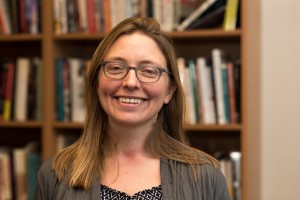 Academic Director and Associate Professor of Labor Studies at the Joseph S. Murphy Institute for Worker Education
Academic Director and Associate Professor of Labor Studies at the Joseph S. Murphy Institute for Worker Education
Areas of expertise: social class dynamics of social movements
Penny received her B.A. at Brown University and holds a Ph.D. in sociology from the CUNY Graduate Center. Her book, Hardhats, Hippies, and Hawks: The Vietnam Antiwar Movement as Myth and Memory, was published by Cornell University Press in 2013. Her current research continues to look at the social class dynamics of social movements. She has worked as a union organizer and has been active in various labor and community organizations, including Jobs with Justice. She serves as a university-wide officer and in the Graduate Center faculty chapter leadership for the Professional Staff Congress, the union that represents CUNY’s faculty and staff.
Stephanie Luce
 Professor of Labor Studies at the Joseph S. Murphy Institute for Worker Education
Professor of Labor Studies at the Joseph S. Murphy Institute for Worker Education
Areas of expertise: living wage campaigns and movements; globalization and labor standards, labor-community coalitions, and regional labor markets
Stephanie received her BA at the University of California, Davis and both her PhD in sociology and her MA in industrial relations from the University of Wisconsin at Madison. Best known for her research on living wage campaigns and movements, she is the author of Fighting for a Living Wage, and co-author of The Living Wage: Building a Fair Economy, and The Measure of Fairness. Her current research focuses on globalization and labor standards, labor-community coalitions, and regional labor markets. Her most recent book, Labor Movements: Global Perspectives, was published in 2014 by Polity Press.
Ruth Milkman
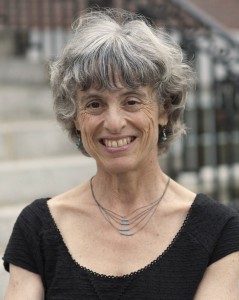 Distinguished Professor of Sociology at the CUNY Graduate Center and Labor Studies at the Joseph S. Murphy Institute for Worker Education
Distinguished Professor of Sociology at the CUNY Graduate Center and Labor Studies at the Joseph S. Murphy Institute for Worker Education
Areas of expertise: work and labor organization in the United States; California’s paid family leave program as well as research on wage theft and other violations of employment law, immigration and labor, the aging workforce, and NYC’s paid sick leave law
Ruth served as Director of the UCLA Institute for Research on Labor and Employment from 2001 to 2008. She received her B.A. from Brown University and her M.A. and Ph.D. from the University of California, Berkeley. Before moving to UCLA in 1988, she was on the faculty at the City University of New York, and then returned to CUNY at the end of 2009. She has written extensively about work and labor organization in the United States, including four sole-authored books: Gender At Work: The Dynamics Of Job Segregation During World War II, which was awarded the 1987 Joan Kelly Prize from the American Historical Association; Japan’s California Factories: Labor Relations And Economic Globalization; Farewell To The Factory: Auto Workers In The Late 20th Century; and L.A. Story: Immigrant Workers And The Future Of The U.S. Labor Movement. Work in progress includes a study of California’s paid family leave program as well as research on wage theft and other violations of employment law.
John Mollenkopf
Consortial Faculty
 Distinguished Professor of Political Science at the CUNY Graduate School
Distinguished Professor of Political Science at the CUNY Graduate School
John, who earned his M.A. and Ph.D. from Harvard University’s department of government, came to the Graduate Center in 1981 from Stanford University, where he taught urban studies and public management. He directs the Center for Urban Research and coordinates the Graduate Center’s urban studies exchange with Humboldt University, Berlin, and its interdisciplinary program on public policy and urban studies. Among the sixteen books he has authored or edited are Bringing Outsiders In: Transatlantic Perspectives on Immigrant Political Incorporation (2009), edited with J. Hochschild, and Inheriting the City: The Children of Immigrants Come of Age (2010), with P. Kasinitz, M. Waters, and J. Holdaway, which won the Distinguished Book Award of the American Sociological Association (ASA), the Thomas and Znaniecki Award of the ASA Immigration Section, and the Mirra Komarovsky Award of the Eastern Sociological Society.
Mollenkopf co-organized the Russell Sage Foundation’s effort to understand the impact of the September 11th attack on New York City and edited its volume, Contentious City (2005). Other recent books include The Changing Face of World Cities (2012), coedited with M. Crul, and Becoming New Yorkers: Ethnographies of the New Second Generation (2004), coedited with Kasinitz and Waters. His Place Matters: A Metropolitics for the 21st Century (2001, rev. 2003), with P. Dreier and T. Swanstrom, won the Michael Harrington Award from the American Political Science Association.
A member of the MacArthur Foundation Research Network on Building Resilient Regions and deeply involved in many New York City policy issues and initiatives, Mollenkopf has been a consultant for numerous city agencies. His renown as a political scientist has taken him as a visiting scholar to the Institut d’Études Politiques in Paris, the University of Amsterdam, the Russell Sage Foundation, and the Center for Advanced Studies in the Behavioral Sciences at Stanford.
Ed Ott
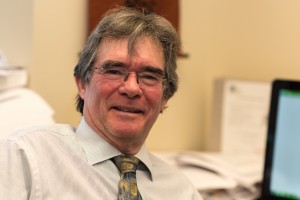 Distinguished Lecturer in Labor Studies at the Murphy Institute
Distinguished Lecturer in Labor Studies at the Murphy Institute
Areas of expertise: the labor movement; pension and social security protection; worker safety legislation; campaign finance reform
Ed has over 40 years of experience in the labor movement, most recently as Executive Director of the New York City Central Labor Council, which represents 1.3 million trade unionists from over 400 affiliated organizations. In that role, he gained a reputation for building productive and respectful relationships between organized labor and community-based organizations, especially those representing immigrant workers. During his tenure as Executive Director, the NYC Central Labor Council, the Taxi Workers’ Alliance became the first worker center organization in the United States to affiliate with an AFL-CIO central body. Prior to assuming leadership of the Council, he served as its Director of Public Policy. In that capacity he played a pivotal role in several legislative initiatives, including passage of the Living Wage bill, the HealthCare Security Act, pension and social security protection, worker safety legislation, and campaign finance reform. Ott began his career in the labor movement as a union organizer, served as a local union officer, and later as the political director for several large labor organizations. He has lectured widely and has served on various public boards, commissions, and task forces. He is frequently quoted in the media.
Frances Fox Piven
Consortial Faculty
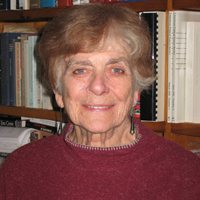
Distinguished Professor of Political Science and Sociology, CUNY Graduate School, Murphy Institute for Worker Education and Labor StudiesDistinguished Lecturer in Labor Studies at the Murphy Institute
Areas of expertise: Issues related to social welfare policy; voter registration, poverty, and social movements
Frances is an internationally renowned social scientist, scholar, and activist whose commitments to poor and working people, and to the democratic cause have never wavered. Piven’s professional accomplishments in the world of academia place her among the ranks of the most important social scientists of the last century. Her groundbreaking work with Richard A. Cloward on the functions of social welfare and poor relief (Regulating the Poor, 1971) received front page coverage in the New York Times Book Review and ignited a scholarly debate that reshaped the field of social welfare policy. Subsequent work analyzed the conditions under which the disruptive actions of the poor influenced the foundation of the modern American welfare state (Poor People’s Movements, 1977) and were necessary to the advancement of progressive social policy and political reforms (The Breaking of the American Social Compact, 1997; Challenging Authority, 2008). Piven is the author or co-author of more than 200 articles published in academic journals, books, popular publications and journals of opinion since 1965, some of which have been republished up to a dozen times. Her scholarship has been translated into Dutch, French, German, Italian, Spanish, and Norwegian and is noted for its boldness and its analytical power and clarity. It relies on historical interpretation, and in its totality, advances sophisticated theories of power from below.
Professor Piven loves teaching at the Graduate Center, where she has found a home for more than three decades. In addition, she has held visiting professorships and fellowships (including Fulbright and Guggenheim awards) at numerous universities here and abroad, such as the Institute for Advanced Studies in Vienna, the University of Amsterdam, Hebrew University, and the University of Bologna, and at the University of Iowa, the University of Wisconsin, the University of California, Arizona State University, the University of Oregon and at Smith College. Her service to the profession runs equally far and wide, and is most prominently noted by her election as a recent president of the American Sociological Association (2007), as President of the Society for the Study of the Social Problems (1980), and as a Vice President of the American Political Science Association (1981).
It is not only Professor Piven’s academic work that marks her career for distinction. Rather, it is the unique and exemplary ways that she has bridged the worlds of academia and social activism to advance humanizing social policy reform that sets her apart. And at this she has been remarkably successful, beginning in the late 1960s, when, along with George Wiley and others, Professor Piven was a founder of the National Welfare Rights Organization (NWRO). Later, in 1982, Professor Piven was a co-founder of the Human Service Employees Registration and Voter Education Campaign, or Human SERVE, which pioneered the idea of “automatic voter registration,” whereby citizens would be registered to vote when they applied for social assistance or drivers’ licenses. After a decade of advocacy and organizing, Human SERVE’s program was incorporated into the National Voter Registration Act of 1993, popularly known as the “motor voter” bill. This legislation represented an historic advance in the struggle to win full enfranchisement for low-income and minority people. Piven and Cloward’s research on the comparatively low levels of voter participation in the U.S.’ book-ended’ their work on reforming the voter registration system with the publication of two scholarly studies, Why Americans Don’t Vote in 1988, and Why Americans Still Don’t Vote and Why Politicians Want It That Way in 2000. The successful blend of scholarship and activism is characteristic of Piven’s entire career.
Professor Piven has enjoyed a lifetime of working with grassroots groups concerned with different facets of poverty and inequality. Her scholar-activism began before the founding of the NWRO, when she was affiliated as a researcher with Mobilization for Youth, the nation’s first federal juvenile delinquency demonstration project. Piven’s grassroots activism continues to this day. She currently serves on the boards of numerous nonprofit and advocacy groups like Project Vote and Wellstone Action, and generously shares her knowledge and funds raised through speaking fees with anti-poverty groups like Community Voices Heard, FUREE, the Center for Community Change, and many others. Piven’s community service has been recognized throughout her career. Most recently, she was the recipient of the Elliott-Black Award from the American Ethical Union, given in tribute for her “life-long commitment to create a society of peace and justice;” the Labor Communicator of the Year Award from the New York Metropolitan Labor Communications Council; the Hon. Shirley Chisholm Lights of Freedom Award from Community Voices Heard, given in recognition of her “leadership toward social and economic justice;” the Elizabeth Gurley Flynn Award from the Brooklyn College Labor Education Center; and the Hope Shapiro Bread and Roses Award from New Jersey Peace Action, in honor of her “commitment to peace and social justice” and her “tireless work to protect and expand voter rights.” In 2014, she received the prestigious Puffin Prize for Creative Citizenship from the Puffin and Nation Institutes.
Basil Smikle Jr.
 Distinguished Lecturer in Politics and Public Policy
Distinguished Lecturer in Politics and Public Policy
Basil Smikle Jr. is a Distinguished Lecturer in Politics and Public Policy at the City University of New York’s Murphy Institute, and a Democratic Strategist whose commentary has been regularly featured on CNN, MSNBC, Fox News, and in TheHill.com where he is a contributor. Basil was most recently the Executive Director of the New York Democratic Party, during which time he was the “second highest ranking Democrat” in the State. A PhD candidate at Teachers College at Columbia University concentrating in Education and Politics, he is also an adjunct lecturer at Columbia’s School of International and Public Affairs.
Recognized as a staunch advocate for public service and education equity, he is part of the next generation of thinkers and policy advocates. A life-long New Yorker and raised in the Bronx by Jamaican immigrants, Basil graduated with a Bachelor of Science from Cornell University in Industrial and Labor Relations and received a Master of Public Administration degree from Columbia University’s School of International and Public Affairs.
James Steele
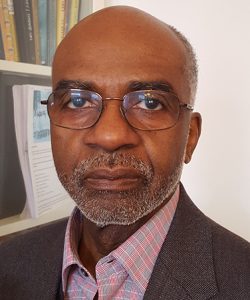 Distinguished Lecturer in Politics and Public Policy
Distinguished Lecturer in Politics and Public Policy
James Steele, Jr. has been appointed Distinguished Lecturer, a position he previously held at the Institute from 2007 to 2011. James has been associated with the Murphy Institute since 1999, when he started teaching as an adjunct instructor. Over the years, he has been responsible for a number of Murphy Institute initiatives, including our popular Civic Engagement and Leadership Development program, which encourages greater participation in electoral politics. Throughout his professional life, James has been a sought-after political consultant and policy advisor to such organizations as the Council of Black Elected Democrats, the Center for Law and Justice, and the Open Society Institute. For the past 20 years, he has served as Special Assistant to Congress Member Gregory Meeks.


